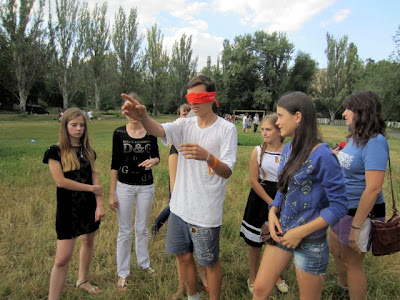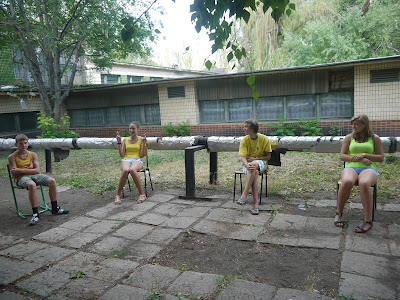Beware Russians asking for T-shirt translations.
A week ago, my neighbour across the hall came out of his apartment at the same moment I did. I had seen him around before: he can frequently be spotted on the building's front stoop, sucking down a cigarette and glowering out at the youths in the yard. This time he stopped me to ask what was written on his shirt.
This shirt would look good on your bedroom floor.
Andrei is a plump, buzz-bald married man in in his early thirties. Obviously he had purchased that particular article of clothing secondhand. Nevertheless, he found it entertaining and it served as an ice breaker between us. We struck up a conversation, but it wasn't an especially fabulous one. I could tell he was struggling to understand me, and I was on my way to buy groceries for dinner anyhow, so I wasn't particularly invested. When he found out my destination, he promptly invited me to dinner. “We're neighbours, we should get to know each other!” I agreed, though cautiously. Everything seemed pleasant enough, but he also did not strike me as the type of person with whom I wanted a close friendship.
How right my instincts were. After stepping foot in his house, I could no longer do anything correctly in his eyes.
“What are you doing? Take your shoes off. What the hell kind of socks are those?” (A: Black dress socks.)
“Would you sit down already, I know my house is nice. Stand up, we're going to move this table. Sit down, dammit!”
If I tried to talk to anyone else in the room, “What, you care more about them than the guy who invited you?”
If I asked about the toys around the house and what I assumed was his child, “What's it to you?”
If I ate, I was wrong. If not, he was insulted.
If I was serious, “You don't understand anything I say.” If I smiled, “What are you laughing at?”
Needless to say, the whole exchange was laced with some of the more choice cuss words of the rich Russian lexicon.
His affable door step nature had become irrationally confrontational. My biggest clue that this was his own problem and not anything I had done was the discomfort with which his wife and close friends sat around the table. I started to recognise other tell-tale signs of drunkeness. He was overly affectionate toward his guy friends, couldn't discern minor pronunciation mistakes, was more than a tad rosy in the cheeks, and repeated himself often. His mantra: “I don't love Americans.” When asked why, his answer was, “I don't like McDonald's.”
His wife Alla was such a trooper. If not for her, I would have felt so much more uncomfortable than I already did. She stayed on him throughout. “Leave him alone. You already said that, and it was rude the first time. We've already discussed this behaviour. You need to go to bed. Why in God's name did you invite him over here if you don't want him to get to know us at all? That's enough, go smoke a cigarette.” After thirty minutes of hen-pecking and “I don't love Americans,” Alla managed to shuffle him out the door for a smoke. When she returned to the kitchen, she flicked her jugular in the universal Soviet symbol which means That guy's wasted and told me, “You had better leave now before he comes back. Don't open the door for anyone.” I thanked her profusely for the invitation, food, defence, and hospitality, and scurried across the hall to the sanctuary of my own apartment, without further incident.
On my way to the market the next morning to gather supplies for cooking club, I hear someone bellow across the crowded street, “Oy, Amerikanitz! Get over here!” Naturally, the morning market throng is staring at me as I tip my cap in a 'Yep, that's me.' sort of gesture. There is Andrei, and I'm nervous. I left last night in secret, without saying goodbye or shaking hands. Russian men can be so weird about that, even if you're not specifically a guest in their home. All seems to be fine, to my relief. I get introduced around to another 5 people, all of whom are very kind. Andrei is apparently still drunk, and has no recollection of what took place last night. “Did I tell you how much I don't love Americans?” Yes. Yes you did.
Another day passes, and I pass Andrei in the stairwell. This must be the first time we've ever spoken and been sober, because he is extremely contrite. He tells me how much he hopes nothing offended me the other night, and apologises for his drunken behaviour. I sweep it all under the rug, wanting only to move on without incident.
It's nice to know that, when sober, he is a perfectly polite man. It's discouraging how rarely he seems to be that way, though. We've gone several days back at our customary nod and hello, and I take comfort in the fact that Alla is indeed an ally. The last thing I need is more neighbour problems, and all I wanted was to be nice and buy some groceries. That's the last T-shirt I translate.
A week ago, my neighbour across the hall came out of his apartment at the same moment I did. I had seen him around before: he can frequently be spotted on the building's front stoop, sucking down a cigarette and glowering out at the youths in the yard. This time he stopped me to ask what was written on his shirt.
This shirt would look good on your bedroom floor.
Andrei is a plump, buzz-bald married man in in his early thirties. Obviously he had purchased that particular article of clothing secondhand. Nevertheless, he found it entertaining and it served as an ice breaker between us. We struck up a conversation, but it wasn't an especially fabulous one. I could tell he was struggling to understand me, and I was on my way to buy groceries for dinner anyhow, so I wasn't particularly invested. When he found out my destination, he promptly invited me to dinner. “We're neighbours, we should get to know each other!” I agreed, though cautiously. Everything seemed pleasant enough, but he also did not strike me as the type of person with whom I wanted a close friendship.
How right my instincts were. After stepping foot in his house, I could no longer do anything correctly in his eyes.
“What are you doing? Take your shoes off. What the hell kind of socks are those?” (A: Black dress socks.)
“Would you sit down already, I know my house is nice. Stand up, we're going to move this table. Sit down, dammit!”
If I tried to talk to anyone else in the room, “What, you care more about them than the guy who invited you?”
If I asked about the toys around the house and what I assumed was his child, “What's it to you?”
If I ate, I was wrong. If not, he was insulted.
If I was serious, “You don't understand anything I say.” If I smiled, “What are you laughing at?”
Needless to say, the whole exchange was laced with some of the more choice cuss words of the rich Russian lexicon.
His affable door step nature had become irrationally confrontational. My biggest clue that this was his own problem and not anything I had done was the discomfort with which his wife and close friends sat around the table. I started to recognise other tell-tale signs of drunkeness. He was overly affectionate toward his guy friends, couldn't discern minor pronunciation mistakes, was more than a tad rosy in the cheeks, and repeated himself often. His mantra: “I don't love Americans.” When asked why, his answer was, “I don't like McDonald's.”
His wife Alla was such a trooper. If not for her, I would have felt so much more uncomfortable than I already did. She stayed on him throughout. “Leave him alone. You already said that, and it was rude the first time. We've already discussed this behaviour. You need to go to bed. Why in God's name did you invite him over here if you don't want him to get to know us at all? That's enough, go smoke a cigarette.” After thirty minutes of hen-pecking and “I don't love Americans,” Alla managed to shuffle him out the door for a smoke. When she returned to the kitchen, she flicked her jugular in the universal Soviet symbol which means That guy's wasted and told me, “You had better leave now before he comes back. Don't open the door for anyone.” I thanked her profusely for the invitation, food, defence, and hospitality, and scurried across the hall to the sanctuary of my own apartment, without further incident.
* * * * *
On my way to the market the next morning to gather supplies for cooking club, I hear someone bellow across the crowded street, “Oy, Amerikanitz! Get over here!” Naturally, the morning market throng is staring at me as I tip my cap in a 'Yep, that's me.' sort of gesture. There is Andrei, and I'm nervous. I left last night in secret, without saying goodbye or shaking hands. Russian men can be so weird about that, even if you're not specifically a guest in their home. All seems to be fine, to my relief. I get introduced around to another 5 people, all of whom are very kind. Andrei is apparently still drunk, and has no recollection of what took place last night. “Did I tell you how much I don't love Americans?” Yes. Yes you did.
* * * * *
Another day passes, and I pass Andrei in the stairwell. This must be the first time we've ever spoken and been sober, because he is extremely contrite. He tells me how much he hopes nothing offended me the other night, and apologises for his drunken behaviour. I sweep it all under the rug, wanting only to move on without incident.
It's nice to know that, when sober, he is a perfectly polite man. It's discouraging how rarely he seems to be that way, though. We've gone several days back at our customary nod and hello, and I take comfort in the fact that Alla is indeed an ally. The last thing I need is more neighbour problems, and all I wanted was to be nice and buy some groceries. That's the last T-shirt I translate.






















































